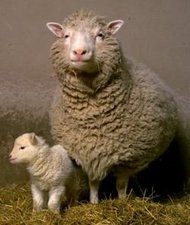Famously, a sheep called Dolly has already been cloned.

There were not two adult sheep to have sex or Yoga to procreate.
- So what "pulls" the soul into the embryo ... if indeed there is one and it does?
If Dolly does not have a soul, how did she say alive?
If Dolly did have a soul, what karma could a sheep do NOT to have two parents, to be a test tube baby and to suffer and die?
If humans are cloned, will they have souls or not, and how?
See previous related discussion, here.
James Button wrote:Monkey cloning raises human fears - November 13, 2007
Human cloning may be one step closer after a technical breakthrough enabled scientists to make dozens of cloned embryos from adult monkeys for the first time, it was reported in Britain yesterday.
Using the same technique that produced Dolly the sheep in 1996, researchers at Oregon National Primate Research Centre in the United States have managed to create viable cloned embryos from an adult primate, according to The Independent newspaper.
Pioneering Australian IVF scientist Professor Alan Trounson hailed the research as a breakthrough, telling the newspaper it was now possible to consider what could be done with humans.
Professor Trounson said that until now it had been thought too difficult to produce cloned primate and human embryos from adult cells. However, "those of us who work (with) animals such as sheep and cattle thought that success rates would be much like that achieved in these species".
The Oregon scientists have not yet managed to produce a cloned offspring, despite reports that they have tried implanting about 100 cloned embryos into the wombs of about 50 surrogate rhesus macaque mothers.
However, using the cells of a 10-year-old male rhesus macaque monkey, they have produced dozens of cloned embryos, and been able to extract stem cells, from which all specialised tissues are generated.
Professor Don Wolf, who until his recent retirement led the Oregon laboratory, said the failure of a female monkey to carry a cloned pregnancy to term might just be "bad luck". It took 277 attempts to create Dolly in 1996.
The research — led by Russian-born scientist Dr Shoukrat Mitalipov and due to be published in the scientific journal Nature later this month — is bound to revive concern about the ethics of cloning a human being.
In Britain it is illegal to place a cloned embryo into a human womb. However, The Independent's science editor Steve Connor wrote: "If the cloning of human embryos becomes straightforward and reliable, then someone, somewhere will attempt to transplant a cloned embryo into the womb of woman. We may not be able to stop such a chilling development."